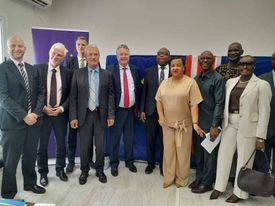The European Union has announced US$31 million for Liberia to expand its technical and vocational education and training (TVET) programs across the country.
The money is part of a larger EU package of US$88 million that would go towards strengthening inclusive and accountable democracy; the ongoing EU Youth Rising TVET project; Forestry and Conservation and peer-to-peer support to boost safe and sustainable food systems.
The financing agreement, which was finalized Monday, May 5, 2023 between the Minister of Finance, Samuel Tweah and Ambassador Laurent Delahousse, the head of the EU Mission comes as part of a new phase of the “EU-Liberia development partnership,” for which a total of US$220 million have been earmarked running from from 2021 to 2025.
The agreement was signed in the context of the 50th Anniversary of EU-Liberia relations. In 1973, the Commission of the European Economic Community established its first office in Liberia, which has since been upgraded to a full diplomatic mission.
The EU’s support for TVET, which carries the larger share of the US$88 million support to Liberia, comes as the country experiences huge technical skills gaps, which pose significant challenges for companies in search of skilled workers.
The lack of skilled workers in key sectors of the economy has been cited as one of the major reasons that Liberians are unable to meet the demands of the labor market — reducing the country’s competitiveness and economic growth potential.
But with the EU’s support, which has already resulted in the construction of the state-of-the-art TVET school in 7 countries might help change the narrative.
The US$31 million would go towards the creation of an additional 8 TVET schools, which would see each one of the fifteen counties benefiting.
“We have gathered here to celebrate a new milestone in our 50-year relationship with the European Union,” Tweah, the Minister of Finance said. “We are all now grouping to do development better, and I think that is what the spirit is about.”
“We’ve got 50 years of lessons to learn by looking back at different phases. Now we have this global initiative, which is a new program, and we have identified key priority areas.”
Tweah was however quick to inform the EU delegation that Liberia per resource is not a poor country but a wealthy nation.
According to him, the challenge for the country has been transforming the potential into reality — whether it is wealth in terms of fisheries, forestry, or iron ore.
However, the Minister noted that the administration of President George Weah has engaged with partners and investors in the process of converting that potential into a reality.
“I believe that’s where the difficulty is. What we are doing here is to answer the question are we going to maximize the opportunity that exists in all of those areas under this new partnership to deliver better for the Liberian people? I think that is what we are signing up to.”
The other three aspects of the EU agreement are US$16.5 million for strengthening democracy with the aims of supporting the upcoming October 10 elections, sustaining peace, and enabling the meaningful participation of women and inclusion of marginalized groups in political processes.
The US$24 million productivity-to-product program is geared towards linking peers to boost safe and sustainable food systems including aquaculture. And US$16.5 million would go to forestry and conservation for sustainable economic development.
The goal is to promote job creation and income generation through the sustainable use and conservation of natural resources such as agroforestry, fuelwood plantation, multipurpose tree nurseries, and the formalization of chainsaw millers.

Delahousse, the EU envoy, explained that the US$16.5 million is not only about the 2023 election but about long-term support to the National Elections Commission. He added that the EU and other development partners want to ensure that Liberia is capable of feeding itself — solving the problem of nutrition.
“We feel that the running of the election has to be taken and financed by the country itself and this is what is happening now,” Delahousse said. “And we are very happy that all the necessary funds have now been provided by the government to NEC to run the election and our support will be additional to that.”
“We want to ensure that under the TVET program, the young people that we are going to train in these institutions have jobs immediately as they come out, which is the best adequacy between the trade that is being given to these young people and the needs of the job market both in government and in the private sector.” Press release

